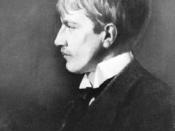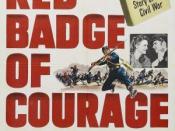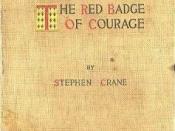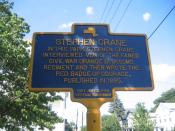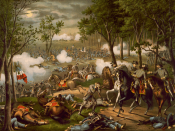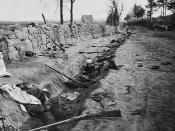Stephanie Navarrete The Red Badge of Courage Throughout the book The Red Badge of Courage, the character Henry Fleming is exposed to many different situations and experiences that only war can bring. He grows mentally throughout the book, and by the end, his priorities and outlook upon life are completely changed from their order in the beginning. During the first half of The Red Badge of Courage, Henry is unsure of himself and his feelings. He broods quietly about his fears of battle. Later he is exposed to his fear of battle, and finds himself running with the rest- though at a second chance his confidence is boosted and his persona changes completely. Through the book his personality and confidence are changed dramatically depending on how confident his comrades are. Through the understanding of war only first hand experience can bring, Henry no longer resembles "the youth" that he referred to himself as during the first of the book, by the time the story ends.
The book starts during the middle of the Civil War, and involves a Union regiment camped along the side of a riverbank where it hasn't moved for weeks. With Rumors of their regiment moving into battle, one soldier, Henry Fleming, was more worried about his courage in the battlefield. The fact that everyone else had a confident smile, and talked eagerly of battle, only added to his fears and exasperated him. The character Henry is obviously naïve, and steadfastly believes in the honor in fighting and battle, which leads the reader to realize that Henry has joined the war for all of the wrong reasons. He never joined to fight for his country, or to fight for a certain cause- or has even formed an opinion of what is right or wrong in this war; but to earn honor, and admiration in the eyes of his peers. He overdoes the thought of dying 'heroically' in the battlefield, and clings to all of these beliefs, even though he himself had had no experience whatsoever in battle for himself to base ideas on. Though, in actuality he is scared more than anything else, of the uncertainty which battle brings, and how small and unsure the idea has made him. "He was forced to admit that as far as war was concerned he knew nothing of himself." In the beginning he began to realize just how vast war is, and how he knew nothing about it, and even less of himself. After hearing the rumors of the regiment being brought into fighting, he was forced to deal with the fact that he would be soon apart of the war, and could no just accept the idea anymore. Soon he realized just how serious the whole situation was, and it of course made him deathly afraid. He soon began to doubt his own courage, and able ness to be strong and stand tall fighting. "He recalled his visions of broken-bladed glory, but in the shadow of the impending tumult, he suspected them to be impossible pictures." He realized again just how little of himself he really knew, and vowed that this was an opportunity to find himself "Whatever he had learned of himself was here of no avail. He was an unknown quantity." Presently his realization that everything he had learned up to that point in reality, at home, at church, had no use in battle, thus he knew nothing of himself in this new immeasurable world.
After coming to is own conclusion of the war, and realizing his petty fears, Henry began to feel suspicious of his comrades, and their unwavering confidence. He began to wonder if whether their confident outlook upon the war, was really just a mask hiding their own selfish fears not unlike him, or where they all too blind or ignorant to realize the seriousness of the whole circumstances. Whenever Henry thinks of his fellow soldiers, he tends to glorify them, and to think of them more heroic and better than him, which seems to give him reason, or an excuse for his own fear. "In regard to his companions, his mind wavered between two opinions according to his mood. Though sometimes he was inclined to believing them all heroes." Henry seems to show signs of low self-esteem, or inferiority when being compared to his comrades. To himself he 'admits' their better qualities that make them so certain and brave. The reader can see Henry making excuses for his cowardice throughout the book, and tries to make his lack of courage valid by saying that the men are better than him, so he can go on with his own uncertain fear.
Later in the book, when fighting is involved, Henry's fear is forgotten when he sees that his comrades are steadfast and have courage. He seems to find audacity, and gathers bravery from the confidence of his comrades around him. His whole attitude changes, and his demeanor becomes somewhat the opposite of what it was before. "He felt that something of which he was a part-a regiment, an army, a cause, or a country-was in a crisis. He was welded into a common personality, which was dominated by a single desire. For some moments he could not flee, no more than a little finger can commit a revolution from a hand." From this quote one can see just how confidence in oneself, can effect so much. At this point in the book his character seems to have shed his other selfish beliefs and thoughts. This may have been intended to mislead the reader into believing that a change has come over Henry- though he reverts back to his ways as before later in the book.
Earlier in the book Henry had thought something that applied to without him realizing it: "The youth had been taught that a man became another thing in battle." And it was indeed true- reading this book I got to see Henry Fleming grow from a boy into a man through many different experiences. He changes significantly through the whole story. The book The Red Badge of Courage gave me great and detailed insight into what it must have been like, and just how frightening and serious it is. What I liked more about it was that it let me see how the people behind the armies, the uniforms, and the guns must have felt. It was written beautifully, and its deep thoughts and interwoven metaphors gave me a challenge to decipher. The Battles were so realistic that it's hard to believe that the author Stephen Crane never experienced war himself. While the reading may have been difficult it was nice to read something more challenging. Overall The Red Badge of Courage is a thought-provoking story of the sentiment and different experiences that go on in and out of the battlefield.
